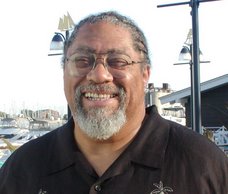
HENRY STONE BLACK MUSIC INNOVATOR
Henry Stone was born and raised on Jackson Avenue in the New York City borough of the Bronx on June 3, 1921. His family stayed in the Bronx until their move to Manhattan’s Washington Heights neighborhood. Henry remained in Manhattan till the age of eight before going away to an orphanage in Pleasantville, New York after his father passed away. He remained at the orphanage until the age of fourteen. It was 1943 when Stone joined the U. S. Army. He was stationed at Camp Kilmore in New Brunswick, New Jersey for three years. He played in the first racially integrated Army Band and recalls, "I spent a lot of time with Black musicians and that’s where I got a lot of my Blues background." After being discharged in 1947, he moved to Los Angeles, working on sales and promotion for Jewel Records and then Modern Records, and traveling around the country.
Henry Stone was born and raised on Jackson Avenue in the New York City borough of the Bronx on June 3, 1921. His family stayed in the Bronx until their move to Manhattan’s Washington Heights neighborhood. Henry remained in Manhattan till the age of eight before going away to an orphanage in Pleasantville, New York after his father passed away. He remained at the orphanage until the age of fourteen. It was 1943 when Stone joined the U. S. Army. He was stationed at Camp Kilmore in New Brunswick, New Jersey for three years. He played in the first racially integrated Army Band and recalls, "I spent a lot of time with Black musicians and that’s where I got a lot of my Blues background." After being discharged in 1947, he moved to Los Angeles, working on sales and promotion for Jewel Records and then Modern Records, and traveling around the country.
Ray Charles came to Miami n 1951 and I ran across him and he told me he needed to do a gig… I invited him to my recording studio and we cut four sides." The 78-RPM recording of St. Pete Florida Blues ended up selling fairly well in the South and is considered highly collectible today.
During the 1950s Henry kept busy by building his distribution company and recording local artists. He says, "I always liked to make records (produce and record them). That was my hobby. I did a lot of Blues stuff with Earl Hooker, John Lee Hooker, The Charms’ "Hearts of Stone", which became an R&B chart #1 hit in 1954. He was also instrumental in signing James Brown to King, and in recording Brown’s first hit “Please, Please, Please”
In 1955, he established his own independent publishing companies and several record labels, including Chart and Dade, mainly recording local blues artists. In 1960, Stone cut "(Do The) Mashed Potatoes" by "Nat Kendrick and the Swans" – actually James Brown's backing band - for the Dade label. He also set up Tone Distribution (originally Tru-Tone), which became one of the world’s most successful record distribution companies. He would distribute records for Atlantic Records, Motown Records, Stax Records and many more independent labels right up through the 1960s and 1970s.
Henry’s success included Betty Wright whose "Clean Up Woman" was a major hit in 1971 on his Alston label. He also set up the Glades label, recording the million selling hit "Why Can’t We Live Together" by Timmy Thomas. In 1972, Stone formed TK Records (named after studio owner Terry Kane), based in Hialeah Florida

Stone’s companies produced numerous other hits during the 1970s, including Beginning of the End’s "Funky Nassau" (on Alston), Latimore’s "Let's Straighten It Out" (on Glades), Anita Ward’s "Ring My Bell" (on Juana), Little Beaver’s "Party Down" and Gwen McCrae’s "Rockin’ Chair" (both on Cat), and Peter Brown’s "Do Ya Wanna Get Funky With Me" (on Drive). Two of Stone’s warehouse employees, Harry Wayne “KC” Casey and Rick Finch, began collaborating on writing and performing songs, with Stone allowing them to experiment in the recording studio after hours. As KC and the Sunshine Band, they released a string of hits such as "Get Down Tonight", "That's The Way I Like It" and "Shake Your Booty", all on Stone's TK label. The band had five number one pop singles, and platinum albums, winning five Grammys in 1976. At the same time, Casey and Finch wrote and produced the number one "Rock Your Baby" by George McCrae, and his follow-ups.
By the late 1970s, the TK Records and its sister labels became pre-eminent in the dance and pop music scene, but suffered badly from the anti-disco movement which followed. TK Records ceased operating by 1981, and Stone went into partnership with Morris Levy of Roulette Records to form the Sunnyview label, issuing records by funk and rap artists such as Newcleus. Stone later became involved with Hot Productions in the reissue of dance classics on CD. Today, he continues reissuing R&B and dance tracks on his own label, The Legendary Henry Stone Presents...
Stone established many different labels on the basis, he said, that it was easier to get records played if the radio stations did not realize they came from the same source.
Here’s a brief list of record labels that Henry Stone had an interest in:
APA
Alston (in partnership with Steve Alaimo)
Blue Candle
Bold
Cat
Chart
Dade
Dash
Deep City
Deluxe (in partnership with King Records)
Drive
Glades
Glory
Gucci
Hot Productions
Kayvette (partnership with Brad Shapiro)
Marlin
Nezz
Reid’s World
Rockin’
Saadia
Scott
Silver Blue
Summer
Sunnyview (in partnership with Morris Levy)
Sunshine Sound Disco (label meant to spotlight KC & Finch productions)
T. K. Records / T. K. Productions
Time-X



